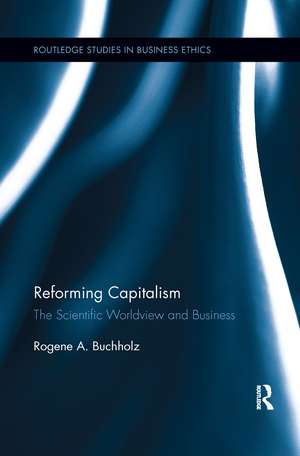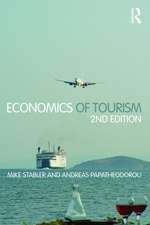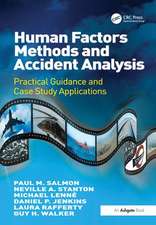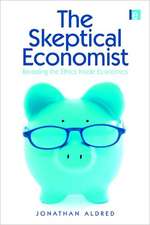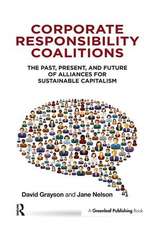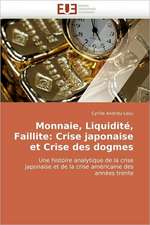Reforming Capitalism: The Scientific Worldview and Business: Routledge Studies in Business Ethics
Autor Rogene Buchholzen Limba Engleză Paperback – 22 mai 2017
| Toate formatele și edițiile | Preț | Express |
|---|---|---|
| Paperback (1) | 416.22 lei 6-8 săpt. | |
| Taylor & Francis – 22 mai 2017 | 416.22 lei 6-8 săpt. | |
| Hardback (1) | 1061.54 lei 6-8 săpt. | |
| Taylor & Francis – 25 apr 2012 | 1061.54 lei 6-8 săpt. |
Din seria Routledge Studies in Business Ethics
-
 Preț: 312.22 lei
Preț: 312.22 lei - 18%
 Preț: 843.40 lei
Preț: 843.40 lei - 18%
 Preț: 1057.09 lei
Preț: 1057.09 lei - 15%
 Preț: 424.06 lei
Preț: 424.06 lei - 22%
 Preț: 324.16 lei
Preț: 324.16 lei -
 Preț: 479.67 lei
Preț: 479.67 lei -
 Preț: 489.26 lei
Preț: 489.26 lei - 17%
 Preț: 258.70 lei
Preț: 258.70 lei -
 Preț: 396.51 lei
Preț: 396.51 lei - 12%
 Preț: 301.75 lei
Preț: 301.75 lei -
 Preț: 396.29 lei
Preț: 396.29 lei -
 Preț: 378.71 lei
Preț: 378.71 lei - 19%
 Preț: 270.82 lei
Preț: 270.82 lei -
 Preț: 382.27 lei
Preț: 382.27 lei -
 Preț: 389.66 lei
Preț: 389.66 lei -
 Preț: 379.60 lei
Preț: 379.60 lei -
 Preț: 389.38 lei
Preț: 389.38 lei -
 Preț: 382.32 lei
Preț: 382.32 lei - 18%
 Preț: 1000.27 lei
Preț: 1000.27 lei -
 Preț: 309.59 lei
Preț: 309.59 lei - 9%
 Preț: 935.26 lei
Preț: 935.26 lei
Preț: 416.22 lei
Nou
Puncte Express: 624
Preț estimativ în valută:
79.64€ • 83.38$ • 65.90£
79.64€ • 83.38$ • 65.90£
Carte tipărită la comandă
Livrare economică 05-19 aprilie
Preluare comenzi: 021 569.72.76
Specificații
ISBN-13: 9781138118379
ISBN-10: 1138118370
Pagini: 360
Dimensiuni: 152 x 229 mm
Greutate: 0.45 kg
Ediția:1
Editura: Taylor & Francis
Colecția Routledge
Seria Routledge Studies in Business Ethics
Locul publicării:Oxford, United Kingdom
ISBN-10: 1138118370
Pagini: 360
Dimensiuni: 152 x 229 mm
Greutate: 0.45 kg
Ediția:1
Editura: Taylor & Francis
Colecția Routledge
Seria Routledge Studies in Business Ethics
Locul publicării:Oxford, United Kingdom
Public țintă
PostgraduateCuprins
Introduction Part 1: The Traditional Scientific Worldview 1. The Rise of Modern Science and Its Characteristics 2. Values and Ethics 3. Economics 4. Politics 5. Culture 6. Nature Part 2: Toward A New Understanding of Science 7. The Pragmatic View of Science and Its Characteristics 8. Pragmatism and Values 9. Pragmatism and Economics 10. Pragmatism and Politics 11. Pragmatism and Culture 12. Pragmatism and Nature Part Three: Implications for Business 13. The Corporation and Community 14. Business and Science 15. Financial Armageddon 16. Management and an Ethic of Service. Selected Bibliography. Notes. Index
Recenzii
"Against the backdrop of seemingly unending business scandals, this book is a must read for all who are interested in the potential of capitalism to serve community needs. Professor Buchholz, a distinguished and prolific business scholar, offers a rare view of how American Pragmatism can inform our understanding of the relationship between science and capitalism and, in turn, business and society. This provocative view has compelling implications for business practice, public policy, and management education." – Diane Swanson, Kansas State University, USA
"Rogene Buchholz’s new book is an important and unique contribution to a growing body of literature suggesting that recent economic crises have stemmed not so much from managerial ineptness but from the faulty philosophical assumptions--ethical, epistemological, and metaphysical--that underlie conventional economic thinking. Buchholz focuses upon the faulty notion of ‘science’ that governs modern economic thought and proposes, with the aid of American pragmatism, an alternative conception of science that includes service and democratic social engagement. If implemented, Buchholz’s profound and clearly articulated vision would go a long way in putting the American economy on a better road to the future." – Ken Stikkers, Southern Illinois University Carbondale, USA
"Rogene Buchholz’s new book is an important and unique contribution to a growing body of literature suggesting that recent economic crises have stemmed not so much from managerial ineptness but from the faulty philosophical assumptions--ethical, epistemological, and metaphysical--that underlie conventional economic thinking. Buchholz focuses upon the faulty notion of ‘science’ that governs modern economic thought and proposes, with the aid of American pragmatism, an alternative conception of science that includes service and democratic social engagement. If implemented, Buchholz’s profound and clearly articulated vision would go a long way in putting the American economy on a better road to the future." – Ken Stikkers, Southern Illinois University Carbondale, USA
Descriere
This book examines the way science influences our understanding of ethics and values, economics, politics, culture, and nature. It then utilizes Classical American Pragmatism as a philosophy, which involves a different way of understanding science that has implications for business and its relation to these environments and well as for management and management education.
